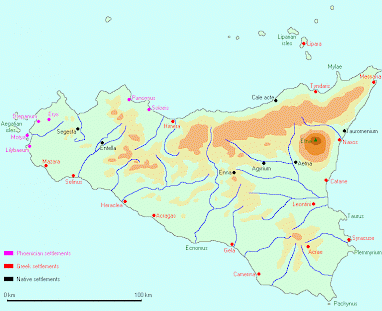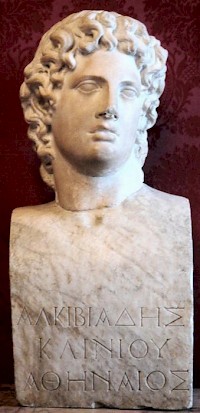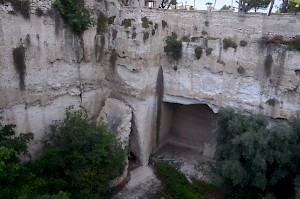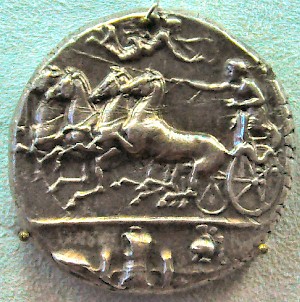Sicilian Expedition
Sicilian expedition: name of the Athenian attempt to conquer Sicily in 415-413, part of the entr'acte in the Peloponnesian War.

Athens had never had much interest in the far west. When it was invited to found a colony in Thurii, the Athenians called it a "panhellenic" (all-Greek) settlement, so that it would not cause irritation in Corinth, which regarded southern Italy as its backyard. This restraint came to an end in the late 430s, when the Athenians allied themselves to Corcyra (Corfu), which gave them control of the Ionian Sea. This was one of the causes of the Archidamian War (431-421), in which many Italian and Sicilian towns supported Sparta and Corinth against Athens. Between 427 and 424, an Athenian navy showed itself in the west, and the Athenians had found allies on Sicily.
The Sicilian cities were now aware of Athenian power, and during a conference at Gela, organized by the Syracusan democratic leader Hermocrates, they decided to make peace with one another and exclude the foreigners from the island. In response to this, an Athenian diplomat named Phaeax concluded alliances with Acragas, Camarina and the natives, because the conference at Gela had not taken away the mutual suspicion that was common among Greek cities.
When Sparta and Athens concluded the Peace of Nicias in 421, the Athenians had their hands free and send out an armada to conquer Sicily. Originally, they had wanted to send a small army to support their allies, but Nicias, who was supposed to take command, asked for a larger force. (Thucydides suggests that he did so because he wanted the Athenians to understand that this expedition was impossible, but they failed to realize this. Thucydides may be right about Nicias' failing policies.) This converted a modest operation into a large expedition, with two consequences: the Athenian allies on Sicily suspected that the armada was not just there to help them, but had other plans; if something went wrong, Athens would be defenseless.

Nicias is not the only one who is to blame for the ultimate disaster. Some Athenians, including the popular leader Hyperbolus, wanted even bigger things, like an attack on Carthage. For the time being, however, the official plan was to support the allies only, but the unmentioned aim was to conquer the island. The commanders were Lamachus, Nicias, and Alcibiades. In 415, the expedition started.
When it arrived on Sicily and the allies started to have doubts, Lamachus proposed to attack Syracuse immediately. According to Thucydides, taking the main city of the island when it was still unprepared, was the best policy. Nicias proposed to support the allies and return home before the display of strength had diplomatically backfired. Alcibiades, the third commander, suggested to find more allies, create a base, and attack Syracuse after this had been achieved.
Lamachus solved the deadlock by joining Alcibiades, and indeed, a base was created at Catana, north of Syracuse. Now, Hermocrates advised his compatriots to create a larger anti-Athenian coalition and ambassadors were sent to Sparta, Corinth, several towns in Italy, yes, even Carthage. Nevertheless, the first year of the Sicilian war had been more successful for the invaders than for the defenders, especially after they had defeated the Syracusans on the bank of the river Anapus.
Still, they had not won the war yet, and the recall of Alcibiades (who was involved in a religious scandal) was a setback. The two remaining commanders decided to sail along the northern shores of Sicily, where they captured a small native town and made money by selling the inhabitants. If there had been sympathy for the Athenians, it was gone after this act of piracy. During the winter of 415/414, Hermocrates convinced several allies of Athens to remain neutral. He also proposed that his compatriots would extend their city's fortifications and reorganize the structure of command. The new system, however, was not a great improvement, and the Athenians started besiege Syracuse.

During the first fight, Lamachus was killed in action, leaving Nicias in command. He was gouty and did not like the siege. The arrival in Syracuse of a Spartan military adviser, Gylippus, turned the tables.
Although the Athenians received reinforcements, commanded by Demosthenes, they had not sufficient cavalry to deal with the powerful horsemen of their enemies. Besides, Nicias made several severe mistakes during the siege. To make matters worse, in 413, the Spartans declared war upon Athens (the Decelean or Ionian War), which made it impossible to send additional reinforcements. In the end, the expeditionary force was completely destroyed (text), the Athenian prisoners of war were forced to work in the stone quarries (the "Latomia dei Cappuccini") until they were dead, Syracuse sided with Sparta and sent ships to the east.

Although Athens was able to continue the war for another nine years, the Sicilian catastrophe contributed to its loss of power. (Another contributing factor was Athenian support for the rebel Amorges, son of Pissuthnes, against the Persian Empire, which provoked the Persian king Darius II Nothus and resulted in subsidies for Sparta.) From now on, Athens had to defend itself, and in 404, Athens was forced to surrender.
For Sicily, the expedition had no less catastrophic results. The island had become destabilized, and the Carthaginians were able to conquer large parts of it. Syracuse was able to repell them only after it had dismantled its democracy and had surrendered itself to a tyrant, Dionysius.